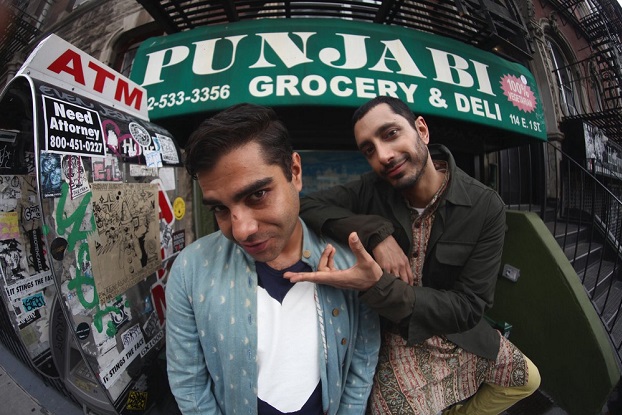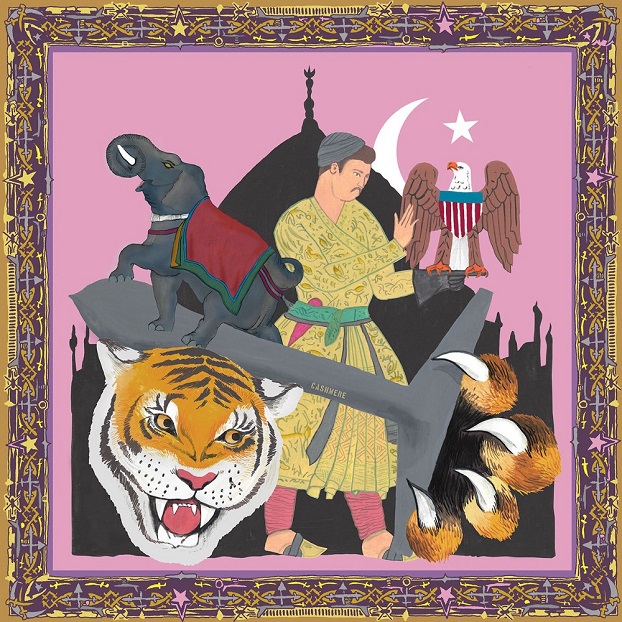Swet Shop Boys perform live at upcoming music festivals in San Francisco (Aug. 13, Outside Lands), and Flushing, NY (Sep. 16, Meadows). Watch their TV debut on The Late Show, and check out their Sufi La EP after reading Tanvi Rajvanshi’s review of Cashmere.
My parents used to have this chest of drawers made of intricately woven rattan. On top of it was this massive cassette player, and after jiggling the top drawer a little, you’d open it to find a treasure trove of Hindi and Urdu cassettes. Going from Kishore Kumar to Sonu Nigam, voices of tradition and voices of Bollywood-pop, my parents had it all. They even had an audiobook collection of Mirza Ghalib’s poetry! To think, centuries of culture arranged nicely into that rattan drawer.
Despite this, music from the subcontinent never quite registered with me. The funny thing about music is that you listen to it to hear yourself. You listen to it in the hopes that it can make you feel that comfort of being understood, without you having to say anything. And as much as I tried, lyrics in Urdu set to a back drop of sitars and tablas never quite did that for me.
But with Swet Shop Boys’ debut album Cashmere, things changed rather profoundly. The moment the album opens with a shrill shenai, over which Heems exclaims, “Inshallah, Mashalla/ hopefully no Martial law,” I knew I had accidentally stumbled on to something that speaks to me at a level I’ve never been heard before — a level that exists somewhere between the different linguistic and musical layers that precondition my everyday life.

Made up of Riz MC and Heems with producer Redinho, Swet Shop Boys embody the complexities of a transnational brown identity. Although Riz is a British citizen and Heems is an American one, Heems explains, “His family from India but Riz Pakistani/ My family from Pakistan but I’m Hindu-Punjabi” on the track “Phone Tap.” It’s a simple lyric, but it cuts to the heart of the issue.
The Swet Shop Boys, whose voices are reminiscent of Eminem and Jay-Z, often reference the India-Pakistan separation and its resulting Hindu-Muslim issues that hit home regardless of where you happen to be brown. The lyric about “gujji refugees,” nodding to Idi Amin’s expulsion of South Asians from Uganda, is telling of how being an immigrant of Indian or Pakistani ethnicity encompasses so much more than just coming from India or Pakistan.
More than “culture,” this identity comes from a place of trauma. It’s an identity that was born out of the very act of abandoning a home, an origin, and migrating to a new one. But lines like, “tryna give Shivani a stack for Rakhi,” contrasted against the Hip Hop trope of showering women with money, show that culture isn’t a root, it’s a creeper vine that entwines its way around this generation of South Asian immigrants and descendants of immigrants who have experienced the world in a multi-cultural, multi-faceted way.
Sadly, in a world where Brexit and Trump reign supreme, this identity may continue to exist in a place of trauma. The matter for this generation, then, is not of claiming an ethnic identity against a white world. For a generation whose entire lives have been embedded in this Indian/Pakistani vs. American/British duality, the matter is of claiming an identity that is an amalgamation of that movement from one culture to another. An identity that simultaneously belongs from within and without.
One of my favorite tracks from this album, “Aaja,” opens with a melodious voice singing, “Aaja, o meri jaan-e-jaan, aaja (come here, my beloved),” over the sound of sitars. But what I like most is how this line leads to rhymes like “You sweet like Baklava, You know I’m hot as Benny Lava.” Immediately, it parodies the Bollywood tradition of peppering vacant songs with Urdu words like “jaan-e-jaan” and “mehbooba” just to make them sound more poetic. At the same time, it easily blends languages and sounds so familiar to the Indian subcontinent with a Hip Hop language and sound that is so familiar to all of us simply by way of being “American” media consumers by default.
“The success of this album is in the way it effortlessly addresses very troubling issues with fast rhymes and quick wit.”
The Swet Shop Boys don’t shy away from politics, in fact, the success of this album is in the way it effortlessly addresses very troubling issues with fast rhymes and quick wit. Heems’ catchy hook from “No Fly List” — “I’m so fly bitch/ but I’m on a no fly list,” seamlessly sews together overused Hip Hop slang with a reference to the kind of xenophobia that is especially prevalent in airport settings. But where Heems’ lyrics speak of quotidien struggles, Riz MC often takes on the heavier themes. Addressing the issue of IS recruits in the track “Zayn Malik,” Riz raps,
You got your mom in tears in Sajda Quran kissing
The politicians at the mic all bayaan giving
I pray for my nephew, I pray you’re not antagonized by all the hating and news and the shit they sanitize
Look Zayn Malik’s got more than eighty virgins on him
There’s more than one direction to get to paradise
It’s a sensitively crafted verse because it demonstrates the awareness of the acute frustrations of a Muslim minority living abroad, and why those frustrations may push him towards extremist factions like ISIS. But at the same time, Riz asserts that joining ISIS on a tirade against the “West” is not a solution.
The pun on ex-One Direction member Zayn Malik’s success saves the track from being preachy whilst also pointing at the success an “ethnic” Muslim Brit has had on the global stage. If anything, the success of Zayn Malik (or even M.I.A.) proves that as long as we keep trying to carve a place for our sounds on the so-called ‘global’ charts, nobody can tell us that we don’t belong.
Listening to this album reminded me of the many times I would talk to my dad in Hindi while Kanye is blasting in my ear. Just so, as “Phone Tap” fades, you hear a recording of Riz’s mum berating him in Urdu for swearing so much. In a humorous twist, his dad tells him to listen to Tupac and learn something. It’s a sample that brought a smile to my face because there really is nothing more comforting than the sound of your parents yelling at you for listening to “weird music”… while you’re listening to the “weird music” in question.
But more than that, it brought a smile to my face because it’s beautiful to see that not only are Swet Shop Boys stylistically inspired by a Hip Hop giant like Tupac, they’re also ideologically inspired by what Tupac stood for — proudly laying claim to your identity regardless of where that may be.
* * *
The original version of this post appeared at https://medium.com/@tanvi.rajvanshi/. Tanvi Rajvanshi is an aspiring arts and culture writer. She graduated with a degree in English literature and film studies from the National University of Singapore, where she is currently a research assistant.













